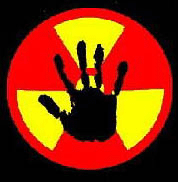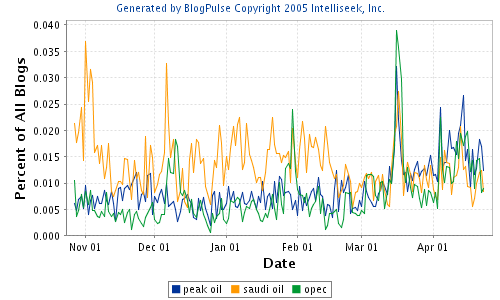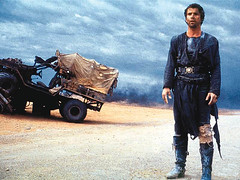 The Herald's Diary of a Day Trader seems to have discovered peak oil, so I guess its safe to say pretty much everyone knows what it is now.
The Herald's Diary of a Day Trader seems to have discovered peak oil, so I guess its safe to say pretty much everyone knows what it is now.
There was great excitement at the number of floats this week: Curnamona, Southern Gold, Kalgoorlie-Boulder Resources, Seek, Novacoat, Api Fund, Fat Prophets and Macquarie Radio.
The day traders went into their usual paroxysms of indecision.
In the resources, everyone seemed to think Kalgoorlie-Boulder and Southern Gold would do well. Curnamona mines uranium, which naturally horrified Professor Valerie Carr-Edwards, our ethical investment consultant.
One is tempted to invest in an unethical stock simply to enrage Val. But there was another reason: Val clearly hasn't heard of the great new hope for nuclear power, which is looking like the planet's only option after China drains the last oil barrel in 2020.
I went for Kalgoorlie, for no other reason than I like the town's topless barmaid policy: it's so Western Australian, and one sometimes wishes the state had seceded from the federation, if only to pursue its novel approach to selling beer.
Curnamona is just one of a slew of small uranium miners (or prospectors, to be more accurate about it) that have been getting attention this year, although the prices for some of these day trader playthings have fallen a bit since they peaked in March (
actual uranium prices still seem to be setting new highs though).
Discussion of the nuclear power option is still gathering steam - Grist (which is as good a place to go for the environmentalist viewpoint as any) has a piece up called "
Half-Life Is Beautiful? On nuclear energy", which discusses the pos and cons of nuclear power in view of the issues created by both global warming and peak oil.
My thoughts on the reconsidering of nuclear power: Well, like you, my head is awhirl from a recent conversation. This fascinating chat was with -- real name here -- Roel Hammerschlag. Roel runs the Institute for Lifecycle Environmental Assessment, a nonprofit dedicated to translating life-cycle assessments (LCAs) from dense studies to readable recommendations. Life-cycle assessments are what you, dear readers, long for when you face the choice between paper towels and hand dryers in the bathroom. In short, they are a scientific way to evaluate the energy use of an object or action over the course of its whole life. As an LCA expert, Roel lives and breathes energy analysis, and when I asked him to rank energy sources, he shocked me as your scientist shocked you. Nuclear is not out of the running for him, and here are his reasons why.
To Roel, and to every knowledgeable environmental writer, scientist, activist, politico, and Grist-er, climate change is the No. 1, emergency-level ecological problem. Unless we deal with this make-or-break situation, nothing else will matter. As a result, Roel says, energy sources must be evaluated with their long-term climate impact in mind. Although nuclear power produces dangerous waste that we have yet to find a way to safely manage, it does not produce greenhouse gases, as does the burning of oil, coal, and natural gas.
Here's Roel's rundown on the energy situation: We are going to run out of oil. Roel is of the Hubbert curve school of thought, which holds that we are halfway through the world's oil supply and will see production dip dramatically within our lifetimes. Given its pending disappearance, Roel says, oil is not the big bad guy. Coal is.
While the article itself says we need to look at nuclear energy anew, most of the commenters are less sanguine about the prospect (although one Norris McDonald gets the idiot award for his comment "Australia is not America" along with numerous other pieces of freeper stupidity).
Meanwhile, (as previously noted by
Monkeygrinder) Helen Caldicott has written a good article
outlining the numerous problems with nuclear energy, and Grist has another, less positive, view of nuclear energy called "
Nuclear Falling Out".
All in all I haven't seen a convincing summation anywhere of either the full end-to-end lifecycle costs (and hence EROEI) for nuclear power, or of any possible "peak uranium" problem that possibly renders the whole exercise pointless in the medium term anyway.
Given the known drawbacks associated with waste disposal and the like, at this point it seems safe to say the justification for a massive program of nuclear power plant building doesn't really exist.
Technorati tags:
peak oil


 I often wonder how people will get around in a lower energy future (assuming the bleaker predictions of mass die off or world war 3 breaking out are incorrect of course). The third world often seems to be a useful guide, as they've already reached that lower energy future before us. One thing I always noticed about third world cities (before they became newly industrialised and everyone bought cars to sit in the traffic jams in) was the vast fleets of scooters. The other thing you notice is that efficient public transport systems don't exist - which is probably due to a combination of poverty and politicians deciding that aid money is best spent on things like weapons or improving their own personal standard of living.
I often wonder how people will get around in a lower energy future (assuming the bleaker predictions of mass die off or world war 3 breaking out are incorrect of course). The third world often seems to be a useful guide, as they've already reached that lower energy future before us. One thing I always noticed about third world cities (before they became newly industrialised and everyone bought cars to sit in the traffic jams in) was the vast fleets of scooters. The other thing you notice is that efficient public transport systems don't exist - which is probably due to a combination of poverty and politicians deciding that aid money is best spent on things like weapons or improving their own personal standard of living. Energy Bulletin has
Energy Bulletin has  One of the alternative energy sources that I like (and there are a few of them) is hydrogen - albeit not the stupider forms of hydrogen that are generated from natural gas (why bother) or nuclear power (just shifting the problem upstream).
One of the alternative energy sources that I like (and there are a few of them) is hydrogen - albeit not the stupider forms of hydrogen that are generated from natural gas (why bother) or nuclear power (just shifting the problem upstream).  "Peak Oil Optimist" Rob has thankfully stopped
"Peak Oil Optimist" Rob has thankfully stopped 
 The Herald's
The Herald's 
 In a recent interview, David Suzuki has echoed Chomsky's view of peak oil - it could have a silver lining in terms of the impact we're having on the environment.
In a recent interview, David Suzuki has echoed Chomsky's view of peak oil - it could have a silver lining in terms of the impact we're having on the environment.
 There seem to be a lot of broker reports talking about peak oil these days - here's a Canadian perspective from
There seem to be a lot of broker reports talking about peak oil these days - here's a Canadian perspective from  Common Dreams has a good general
Common Dreams has a good general  The Alternative Energy blog has a good post up on the new wave of energy efficient light bulbs
The Alternative Energy blog has a good post up on the new wave of energy efficient light bulbs  This sounds almost too good to be true - TreeHugger reports on a company making
This sounds almost too good to be true - TreeHugger reports on a company making  TreeHugger has a review of a selection of
TreeHugger has a review of a selection of  I've had a post on this topic gestating for a very long time now, so naturally someone else has beaten me to it.
I've had a post on this topic gestating for a very long time now, so naturally someone else has beaten me to it. EnergyBulletin has
EnergyBulletin has 



